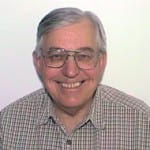Podcast: Download (38.0MB)
Subscribe: RSS
 David L. Paulsen received an associates degree from Snow College in English in 1957, a bachelors degree from BYU in Political Science in 1961 (in which he was BYU’s valedictorian), a JD from the University of Chicago Law School in 1964, and a Ph.D. in philosophy from the University of Michigan in 1975, with emphasis in the philosophy of religion. His doctoral dissertation, entitled The Comparative Coherency of Mormon (Finitistic) and Classical Theism, was said by two philosophers critical of LDS theology to be “by far the most detailed and comprehensive defense of Mormon theism.”
David L. Paulsen received an associates degree from Snow College in English in 1957, a bachelors degree from BYU in Political Science in 1961 (in which he was BYU’s valedictorian), a JD from the University of Chicago Law School in 1964, and a Ph.D. in philosophy from the University of Michigan in 1975, with emphasis in the philosophy of religion. His doctoral dissertation, entitled The Comparative Coherency of Mormon (Finitistic) and Classical Theism, was said by two philosophers critical of LDS theology to be “by far the most detailed and comprehensive defense of Mormon theism.”
He is the author of an article in BYU Studies entitled: “A Mother There” A Survey of Historical Teachings about Mother in Heaven. Paulsen is married to Audrey Lucille Leer and has six children and eleven grandchildren. Recently returned from a mission with his wife to Iceland, welcome David L. Paulsen.
Questions and topics addressed in this interview:
Among your other articles is one that address an subject that is enigmatic for some, perhaps a rational conclusion for others. That is the subject and being of Heavenly Mother. We should give credit where credit is due. You had a research partner on this. Who is it, and what did they contribute?
“Penned in 1845 by Sister Eliza R. Snow (who would later serve as the Relief Society general president from December 18, 1867–December 5, 1887), these lines from our beloved hymn “O My Father” are perhaps the best-known reference in Latter-day Saint literature to a Mother in Heaven. Written and published within months of Joseph Smith’s death, these and other lines give considerable evidence that the Prophet taught of a Mother in Heaven, even if he did so only implicitly or restrictively to certain limited audiences.”
What is the earliest text that we have that mentions a heavenly mother, even if it is apocryphal?
Has anyone ever claimed to have had a vision of her?
There is a teaching that I have heard, and that is that we are not supposed to talk about our Heavenly Mother. It is too sacred to talk about. Where did that come from, and is there any substance to that concept? You refer to this in your article about, ““sacred” censorship.”
What might the warnings be with regard to a discussion of God Mother, or Heavenly Mother? Would worship be inappropriate and if so, why? Is she part of the Godhead?
As the song, Oh My Father, alludes, there has been a longing in the undercurrents of mormon thought for a connection to the feminine divine. How much of what we read is actual doctrine, official teachings of the church, vs. the longings and educated statements regarding who Heavenly Mother is, or if she exists?
There is also a notion that because God the Father and God the Mother are so unified that there is no need for distinction in holy writ or in our discourse as you cannot speak of one without speaking of the other. From what you have studied is our Heavenly Parents this androgynous concept of deity the dominant idea, or are there still some elements of individuality that each possess uniquely, but it is there combined effort that we experience?
The question arises with regard to Heavenly Mother’s involvement in our daily lives. The following is quote from President Harold B. Lee :
“Sometimes we think the whole job is up to us, forgetful that there are loved ones beyond our sight who are thinking about us and our children. We forget that we have a Heavenly Father and a Heavenly Mother who are even more concerned, probably, than our earthly father and mother, and that influences from beyond are constantly working to try to help us when we do all we can.”
Elder Glenn L. Pace (First Quorum of the Seventy, October 3, 1992–October 2, 2010) at a 2010 BYU devotional: “Sisters, I testify that when you stand in front of your heavenly parents in those royal courts on high and you look into Her eyes and behold Her countenance, any question you ever had about the role of women in the kingdom will evaporate into the rich celestial air, because at that moment you will see standing directly in front of you, your divine nature and destiny.”
David L. Paulsen and Martin Pulido are the authors of “A Mother There” A Survey of Historical Teachings about Mother in Heaven.
Links from the episode:

Nick, this was a wonderful podcast. Just listened to it again yesterday and I need to reread Brother Paulsen’s article and study it closer than I did the first time. Thanks for all the hard work you’re doing for FairMormon. It is much needed and much appreciated!